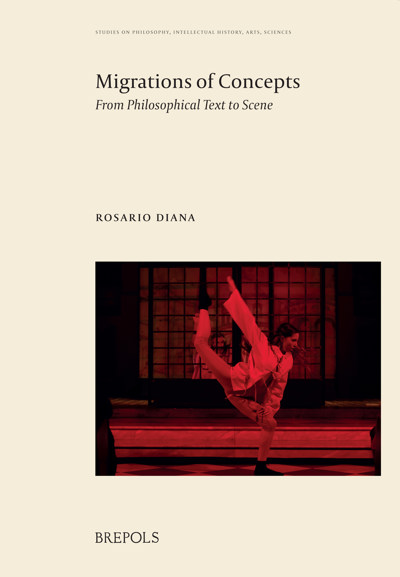
- Pages: 196 p.
- Size:178 x 254 mm
- Illustrations:15 b/w
- Language(s):English
- Publication Year:2023
- € 85,00 EXCL. VAT RETAIL PRICE
- ISBN: 978-2-503-60562-3
- Hardback
- Available
- € 85,00 EXCL. VAT RETAIL PRICE
- ISBN: 978-2-503-60563-0
- E-book
- Available
Migrations of Concepts brings together the results of an experimental research on the migration of philosophical concepts into the languages of the visual and musical arts and proposes a new way to study and communicate philosophical concepts.
Rosario Diana is a senior researcher in philosophy at the Ispf-Cnr, Naples. Parallel to his philosophy studies, he has also completed musical composition studies. He has several translations and curatorships to his credit as well as a production of essays and monographs on figures of Italian and German philosophy. For some time he has applied himself to intercultural philosophy and issues relating to the dissemination and transposition of philosophical knowledge through the theatrical, audiovisual and musical arts.
Migrations of Concepts brings together the results of an experimental research on the migration of philosophical concepts into the languages of the arts. The monograph explores the intersection of philosophy, literature and art and presents a theoretical-performative investigation on the transposition of philosophical contents into theatrical and musical performance. Starting with Giambattista Vico and Samuel Beckett, a first part elaborates the paradigm of the ‘Disbelonging’ of the I – which is the condition of the I who realizes that it is both its own and foreign at the same time –, shows how this is transposed into the language of sounds, and reflects on the significance of public performance of a philosophical work. The second and third parts further explore the transposition of philosophical thought into art by presenting the theatrical performances written and directed by the author. More specifically, the book contains the text of two theatre readings on Vico and Gorgia, and the libretto of two melologues dedicated to Hegel and the Prince of Sansevero, with the corresponding scores of music composed by Rosalba Quindici. By exploring the boundaries of adaptation studies this monograph radically proposes a new and innovative way to study and communicate philosophical concepts.
Introduction
First Part. Beckettian Migrations
De-powering of the Cartesian Cogito and “Disbelonging” of the I: In the margin of De antiquissima of Giambattista Vico
Conceit and Collapse of the I: Becket and Geulincx
The Ontopoietic Eye: Becket and Berkeley
Percipi. For Soprano, Clarinet in B Flat, Viola, Cello, Percussions, Piano. Musical Score by Rosalba QuindiciVoices from a Life: A Performance of Passages from the Life of Giambattista Vico Written by Himself (1723-28). Contribution to the Theoretical Justification of an Audio-Video
Second part. From Oratory to Word Music
The Heroism of the Scholar: Reading in Concert Form of Giambattista Vico’s Oration De mente heroica (1732) for solo reciters and chorus of readers. Texts by Plato, Pseudo-Longinus, Giambattista Vico freely adapted
An Encomio in Two Speakers: Theatre-reading on Enconium of Helen by Georgias de Leontini
Third Part. From Philosophy to Melologues
Offshoots of Hegel: From the Autobiography of a Servant. Melologue in Two Scenes and Ten Stanzas for Reciting Voice and Prepared Piano (Libretto)
Offshoots of Hegel: From the Autobiography of a Servant. Musical Score for Prepared Piano by Rosalba Quindici.
The Veiled Thought: A Nocturnal Meditation by the Prince of Sansevero. Melologue in Four Scenes for Reciting Voice, Recorded Voices and Percussions (Libretto)
The Veiled Thought: A Nocturnal Meditation by the Prince of Sansevero. Musical Score for Percussions by Rosalba Quindici


